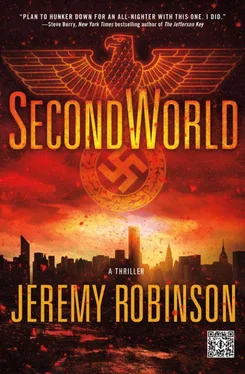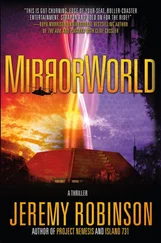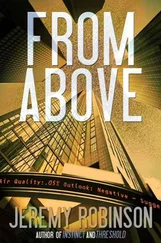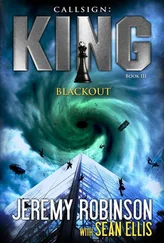“To jest policja. Wyjdźcie z podniesionymi rękami!”
Miller, Adler, and Vesely all snapped toward the sound of the amplified voice, just outside the factory.
“It’s police,” Vesely said. “They want us to come out.”
“They sound angry,” Adler said as the officer repeated his command.
“If they found Brodeur and his two MP5s they’re probably pissed,” Miller said.
“Backup is probably en route,” Adler said.
Miller clenched his fists. “We don’t have time for this.”
Vesely whipped off his belt and holsters, tucked the two .38s into his pants behind his back, and headed for a hole in the front wall. “Watch my back, Survivor?”
Miller wanted to object, but Vesely stepped into the sunlight before he could say anything. The police started shouting a moment later. Miller peeked through a hole in the wall and saw Brodeur lying against the hood of one of two police cars, hands cuffed behind his back. Two officers stood beside him, weapons drawn and pointed at Vesely, who strode confidently toward the men.
That’s when Miller noticed the weapons the officers carried were Micro-Uzis, which from a distance looked like standard handguns, but could actually fire 1,200 rounds per minute. Two things quickly occurred to him. First, these weren’t police. Second, they were about to tear Vesely apart. But it was too late to warn the man without revealing himself as well.
Vesely approached the officers calmly, open passport clutched in one of his raised hands. His body language was relaxed and the faux police approached him less aggressively than Miller expected. That was, until they got a look at the name on his passport.
Both officers took a reflexive step backward, Miller assumed because they didn’t want to get splattered with Vesely’s blood. The step only took a second, but it was longer than Vesely needed. The man’s hands came down and behind his back in a blur. He drew both .38s, leveled them at both men’s chests, and pulled the triggers. Twin explosions of blood and gore burst from the two men’s backs as the high-caliber rounds tore through them.
Miller charged out of the factory as two more officers appeared behind the cars, which left only their heads for targets. Miller fired twice and one of the officers’ heads snapped back. He dropped down behind the car. The second officer opened fire, causing Miller to dive for cover. But the man only got off three shots before Vesely turned one of his hand cannons on the man and fired a single round. Unlike the man Miller had shot, this man’s head burst like a melon.
“Good God, man,” Brodeur said from the hood of the car, where he still lay, cuffed. “You could have shot me!”
“I do not miss,” Vesely said.
“Right, you’re a cowb—”
A single shot rang out. Vesely spun, but not in reflex. He’d been struck in the shoulder.
Miller turned toward the sound of the shot and saw another officer standing at the corner of the factory. The man’s Micro-Uzi was already leveled at Miller, who knew he wasn’t nearly as fast a draw as Vesely.
Fortunately, he didn’t need to be.
Three shots fired.
The first two struck the officer’s chest, twitching his body with each impact. The third shot punched a hole in the man’s nose. The round, slowed by bone and brain, didn’t exit the skull, but the effect on his body was no less dramatic. He fell in a heap.
Miller turned and found Adler by the ruined factory wall, gun still raised in a solid shooter’s stance. “Thanks.”
She kept her weapon raised and stayed silent. Together, she and Miller scanned the area for more hostiles and peeked around the factory corner. All seemed quiet. When they turned back to the cars, they found Vesely holding a hand over his shoulder, which was wet with blood. Brodeur was still cuffed, but stood on his feet. His cheek was swollen.
“What happened?” Miller asked Brodeur.
“I was in the car. Didn’t hear them coming.” He pointed to his injured cheek. “Sucker punched me through the open window, dragged me out, cuffed me, and threw me on the hood.”
“Why did they not shoot you?” Vesely asked.
“How the hell should I know?” Brodeur said, his typical good nature fading fast. He locked his eyes on Vesely. “Maybe because my name’s not on the list. It was your name they reacted to.” He shook the cuffs at Miller. “Can you please get these off of me?”
Miller searched a body and found the cuff keys. He freed Brodeur and turned to Vesely. “How’s the shoulder?”
“Is nothing. The man’s aim was horrible.”
Adler lifted Vesely’s hand away, found the hole the bullet had torn in his shirt, and ripped it open. She inspected the wound. “Looks like it could use a few stitches.”
Vesely waved her off. “Let it heal. Will leave scar. Women will like it.”
Adler smiled and tore the sleeve the rest of the way off, ignoring Vesely’s protests. She tied the sleeve around his shoulder. “Keep it there until the bleeding stops. Then you can look tough and not bleed to death.”
Vesely chuckled, but then grew serious. “Survivor, before I risk my life for this cause, I would like to know how they found us.”
“Maybe a local called it in to the police?” Adler asked.
“Police in Poland do not carry Uzi,” Vesely said, picking up one of the weapons and showing it to her. “They came for me.” He nodded to Adler and then to Miller. “They came for both of you.” He turned to Brodeur. “But not for him.”
“If you’re implying that—”
“I imply nothing,” Vesely said. “He was not on the list, yes?”
“No, just the three of us,” Miller confirmed.
“Then perhaps this is why you were not shot. Or perhaps they simply did not want to reveal their presence. I cannot say. What I can say is that they knew we were here.”
“Maybe they followed you?” Brodeur said.
“Is not likely,” Vesely said. “I was very careful. But is possible. If they are embedded in the U.S. military as deep as we suspect then perhaps they are watching us even now.”
All four turned their faces to the sky, as though they could see the satellite watching them. Vesely lifted his fist and extended his middle finger.
“What are you doing?” Adler asked.
“I am sending message,” Vesely said. “I say, fuck you.”
“Great,” Brodeur said. “Can we leave before a drone shows up and blows us to kingdom come?”
After squeezing into the small rental car, they left the five officers—if they were indeed officers—dead where they lay.
“Where to?” Adler asked as she sat at the steering wheel.
“Back to the airport,” Miller said. “I have some flights to arrange.”
He took the iPhone out of his pocket.
“Do not use that!” Vesely shouted. “Don’t you know it can be tracked?”
Miller shared Vesely’s paranoia about the phone, but it was a necessary risk, so he decided to put the Cowboy’s mind at ease. “Not this phone,” Miller said. He dialed, glanced back at Vesely, and said, “Mr. President, it’s Miller.”
Vesely’s eyes opened wide as he realized to whom Miller spoke. But then he turned to Adler and whispered, “Perhaps it is the president who betrayed us?”
Adler turned back to Vesely and whispered, “I don’t think the black president of the United States is a Nazi.”
Miller ignored the conversation happening around him and focused on the president. The man sounded stressed, but still in control. Still fighting.
Miller quickly relayed everything that had happened and explained that the military should be trying to find and destroy stealth satellites in Earth’s orbit. He then relayed a list of required equipment, where he needed to go, how he needed to get there, and his suspicions about the aircraft carrier group stationed off the Antarctic coast.
Читать дальше












